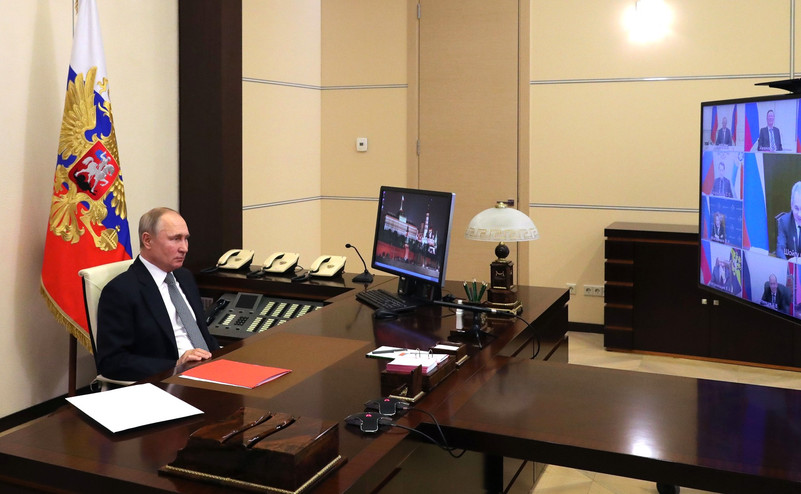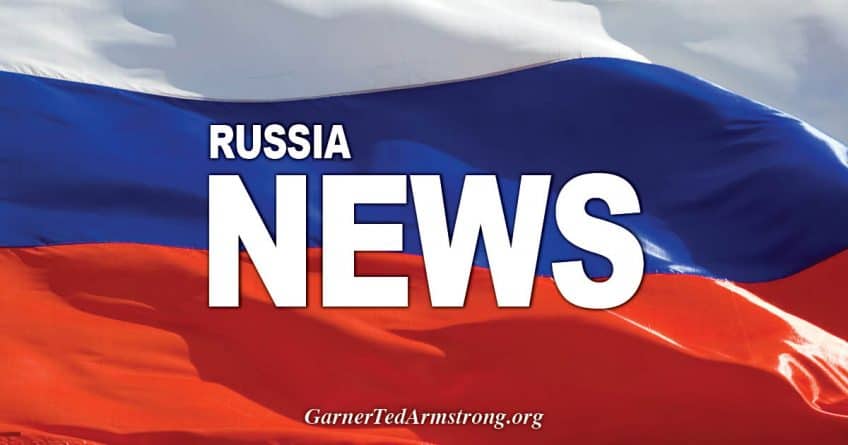
Russian president Vladimir Putin during a video-conference with security chiefs last week (Photo: kremlin.ru)
Arguments over the plight of opposition leader Alexei Navalny and Saturday’s (23 January) street protests across Russia demonstrate that there is no such thing as purely domestic politics, and may have serious implications for Europe.
Navalny, poisoned by Russian security officers in August, had been recuperating in Berlin until his return on 17 January.
His prompt arrest on questionable charges triggered major nationwide protests this past Saturday, but what was no doubt originally envisaged by the Kremlin as a purely domestic act of repression has become an international concern.
The Kremlin had made it clear that its immediate response to the protests is it to try and outlast them.
It is digging in its heels over Navalny’s detention (lest it looks weak), maintaining a tough line with protests (with the understanding that it could be even more brutal) and escalating its propaganda about Navalny and the opposition movement as a whole (to try and delegitimize it).
The hope is that over the weeks, the initial flush of outrage and excitement wanes and the protests lose their momentum.
Collision course
Meanwhile, though, Europe cannot keep quiet about Navalny’s treatment and the often-heavy-handed behaviour of the security forces during the day of protest.
European Council president Charles Michel has called for Navalny’s immediate release and European Union foreign policy chief Josep Borrell criticized the “widespread detentions [and] disproportionate use of force”.
The likelihood is that words will lead to some form of action, probably more sanctions placed on individuals associated with Navalny’s case, in line with the European Parliament’s resolution of 21 January.
If past behaviour is any guide, Moscow will push back, at least with tough rhetoric and possibly specific measures.
This is business as usual in the current age of tit-for-tat, playground diplomacy.
However, there are grounds of concern that this may contribute to a more serious escalatory cycle.
First of all, a central element of the Kremlin’s often-toxic propaganda campaign is to present the opposition as either the knowing agents of foreign subversion or its gullible dupes.
At present, this is focusing on the US, which is being accused of organizing the marches and bankrolling Navalny.
The pro-government tabloid Komsomolskaya Pravda even suggested that Washington had counted on bloodshed this weekend, but was disappointed when “the authorities showed leniency, made allowances for youthful maximalism”.
However, these kind of propaganda campaigns have, in the past, proven easier to launch than to control, as they acquired lives of their own.
If and when the European Union begins to make its voice heard, at least on an unofficial level, it will similarly begin to be castigated for supposedly interfering in Russia’s politics and trying to export its “degenerate values”.
Active measures
This could come to constrain the Kremlin’s wider relations with Europe, but more generally, if the protests do maintain a momentum, then the risk is that the Kremlin, feeling embattled, will adopt ever more extreme tactics – and not confine them to its own borders.
Its onslaught on those it considers traitors has already led to the Salisbury poisonings of 2018 and the apparent execution of Chechen Zelimkhan Khangoshvili in Berlin at the end of 2019.
The former proved to have a substantial political cost, triggering a global campaign which saw 153 Russian spies and diplomats expelled from 29 countries.
The latter, by contrast, was handled very mildly, with just two expulsions from Berlin.
The Russian opposition benefits not only from a network of allies, spokespeople, and cheerleaders in Europe, but also from independent coverage by Russian-language media outlets such as Meduza, which is based in Riga, and US-broadcaster RFE/RL, in Prague.
But in this climate, existing campaigns of surveillance and vilification could take more concrete forms.
Given that it appears to be treating its current political struggle as an existential one, to be fought by whatever means necessary, if the Kremlin feels it has little reason to fear European responses, then it may expand its campaign of so-called ‘active measures’ abroad.
Belarus
The crisis in Russia could also affect Belarus.
At present, Putin – no personal friend of Alexander Lukashenko – is carefully calibrating the level of support he offers.
The hope appears to be to forestall a collapse of the Belarusian regime, while easing Lukashenko out and replacing him with a new, less-toxic figure.
However, the parallels between Minsk and Moscow have not been lost on the protesters on either side – some of the Russian demonstrators chanted ‘long live Belarus’ – and likely not to the governments, either.
Those on the hawkish wing of Kremlin politics, who have long argued that any hint of concessions to the ‘street’ in Belarus could embolden their counterparts in Russia are likely to be all the more persuasive now.
Lukashenko, ever the wily opportunist, will no doubt add his voice to theirs.
This too will become a challenge for European diplomacy and security policy.
What happens in Russia, it is clear, does not stay in Russia.
Source: https://euobserver.com/opinion/150707
[Disclaimer]








